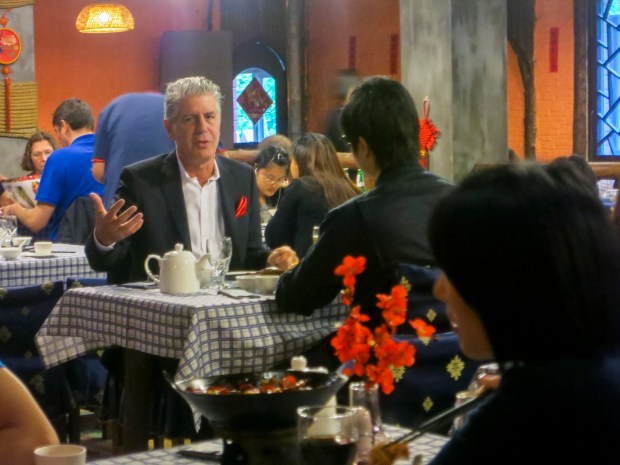Synopsis: The rapidly modernizing metropolis of Shanghai is as diverse as China itself. Bourdain takes in the new with the old as he visits traditional restaurants and wonton stands, dines with members of the city’s growing upper class, and attends a wedding banquet. Though pockets of Shanghai seem to have preserved the past, most of the city is lurching toward the future.
On China’s influence on the world market:
“From what I see everywhere I go, the world is becoming more Chinese—Chinese influence, Chinese food. You build a hotel in Vegas or a casino in Singapore, you have to consider, What will the Chinese think?”
“For me, I think the communist menace that we used to always talk about in America— I think the most terrifying scenario is that China becomes a completely free-market, nonsocialist, noncommunist society—because you’d bury us!”
On Chinese food in New York:
“I grew up in the ’50s and ’60s, and even then Chinese restaurants and Chinese food was really an essential part of being a New Yorker. I mean, if you didn’t know how to use chopsticks as a New Yorker, you were a terrible New Yorker.”

Defending his opinion that the cumin ribs are good:
Bourdain: “I’ve eaten a lot of food. This is spicy, fresh, bright, vibrant—”
Thomas Yao (tech entrepreneur): “After this I will take you somewhere better.”
On drinking in China:
“When I first came to China, it was for business, and one after the other everyone at the table came up and said, ‘Ah, Mr. Bourdain, I would like to do a drink with you,’ and they’d [drinking motion] all of it! I didn’t know how to politely say no. So I just kept doing it and doing it, and I got super f***ed up. I ended up going out to karaoke. I ended up singing a Billy Idol song. I think I sang ‘White Wedding.’”
Guests weigh in:
Yao Minji (reporter) [on China’s new position as a giant in the world market]: “It’s exciting that we finally have an influence. China is sort of in the spotlight, in the center of the stage now in a way that we wouldn’t have dreamed of, say, only a decade ago.”
Tim Tse [on the opportunities for wealth in Shanghai]: “It’s a big world and a big city but a small village at the end. And I think food is the best weapon on earth to make peace. It’s the food; it’s the drink. We’ll have better peace on earth, and you’re probably the United Nations ambassador.”
Bill Wang [on the most noticeable changes in Shanghai in the past 10 years]: “Food like this is becoming more and more difficult to find. This is handmade, and I think it is real food. It’s not very expensive and tastes great.”